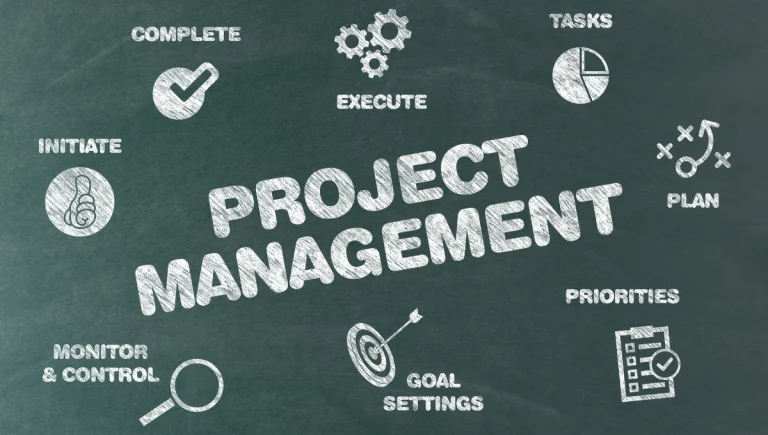Project management is a critical discipline that plays a vital role in ensuring that projects are completed on time, within budget, and to the satisfaction of all stakeholders. From small-scale initiatives to large, complex undertakings, effective project management can be the difference between success and failure. This guide explores the key principles, methodologies, and best practices in project management, providing valuable insights for both beginners and seasoned professionals.
Understanding Project Management
Project management involves the application of knowledge, skills, tools, and techniques to project activities to meet the project requirements. It encompasses planning, executing, and closing work to achieve specific goals within a specified time frame. The primary goal of project management is to deliver a project that meets or exceeds the expectations of stakeholders, while also managing resources efficiently.
Key Components of Project Management
1. Project Scope
Defining the project scope is the first step in project management. It involves determining what needs to be accomplished, the boundaries of the project, and the deliverables. A well-defined scope helps in avoiding scope creep, which can lead to delays and cost overruns.
2. Project Timeline
Creating a project timeline involves setting deadlines for each phase of the project. This includes breaking down the project into manageable tasks, assigning deadlines, and ensuring that all team members are aware of their responsibilities. Effective time management is crucial for keeping the project on track.
3. Budget Management
Budget management is essential for ensuring that the project is completed within the allocated financial resources. This involves estimating costs, monitoring expenditures, and making adjustments as necessary to stay within budget.
4. Risk Management
Identifying and managing risks is a critical aspect of project management. This involves assessing potential risks, developing mitigation strategies, and preparing contingency plans to address any issues that may arise during the project.
Project Management Methodologies
Several project management methodologies have been developed to help manage projects more effectively. Some of the most popular include:
1. Waterfall Methodology
The Waterfall methodology is a linear and sequential approach to project management. It involves completing one phase of the project before moving on to the next. This method is ideal for projects with well-defined requirements and a clear scope.
2. Agile Methodology
Agile is an iterative and flexible approach to project management. It involves breaking the project into smaller, manageable chunks called “sprints,” which are completed in short cycles. Agile is particularly effective for projects where requirements may change over time.
3. Scrum
Scrum is a subset of Agile and focuses on delivering small increments of the project within a set time frame, usually two to four weeks. It emphasizes collaboration, adaptability, and continuous improvement.
The Role of a Project Manager
The project manager is the person responsible for leading the project team and ensuring that the project is completed successfully. The project manager’s responsibilities include:
- Planning and Scheduling: Developing a detailed project plan that outlines tasks, timelines, and resource allocation.
- Team Management: Leading and motivating the project team, ensuring that everyone is working towards the same goals.
- Communication: Keeping all stakeholders informed about the project’s progress, challenges, and changes.
- Problem Solving: Addressing any issues or obstacles that arise during the project and finding solutions to keep the project on track.
Tools and Techniques for Effective Project Management
Modern project management relies heavily on tools and techniques that help streamline processes and improve efficiency. Some of the most popular project management tools include:
1. Project Management Software
Software like Microsoft Project, Trello, and Asana help project managers plan, track, and manage tasks. These tools provide a centralized platform for collaboration, allowing team members to stay aligned and informed.
2. Gantt Charts
Gantt charts are a visual representation of the project schedule. They show the start and end dates of tasks, as well as the dependencies between them. Gantt charts are invaluable for tracking progress and ensuring that the project stays on schedule.
3. Risk Management Tools
Tools like Risk Register and SWOT analysis help project managers identify, assess, and mitigate risks. These tools provide a structured approach to managing potential challenges and ensuring that the project remains on track.
The Importance of Continuous Improvement
Continuous improvement is a key principle in project management. After the completion of a project, it’s essential to conduct a post-project review to identify lessons learned and areas for improvement. This process helps in refining project management practices and improving future projects.
Conclusion: Achieving Success in Project Management
Effective project management is essential for the success of any project, regardless of its size or complexity. By understanding the key components, methodologies, and tools, project managers can ensure that their projects are completed on time, within budget, and to the satisfaction of all stakeholders. Whether you’re new to project management or an experienced professional, continuous learning and improvement are critical to staying ahead in this dynamic field.
For more detailed insights and tools to enhance your project management skills, visit website. Explore our resources and discover how we can help you achieve success in your next project.




